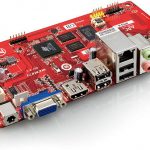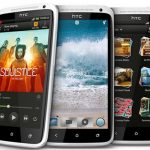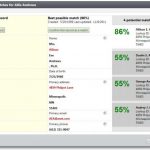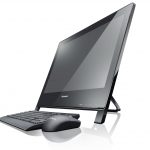Raspberry Pi not enough for you? How about a $49 Android PC?

Taiwanese fabless semiconductor company Via Technologies on Tuesday unveiled its affordable, low power Android PC system, known simply as APC.
The $49 board uses the Neo-ITX form factor, which at 170 x 85 millimeters is the same length as Mini-ITX, but half as wide. It is powered by the VIA WonderMedia ARM 11 system on a chip, which is equipped with an 800MHz processor, 512 MB of DDR3 RAM, and has integrated GPU capable of video outputs up to 720p in resolution. It also has 2GB of NAND Flash storage, HDMI and VGA ports, four USB 2.0 ports, 1/8" headphone jack and mic input, microSD slot, and 10/100 Ethernet connectivity. The whole thing runs off of a 15 W power supply and is loaded with a version of Android 2.3 optimized for keyboard and mouse input.
Much like the wildly popular Raspberry Pi project PC which debuted last February, the APC is meant to be a "technology enabler" more than a powerhouse for computing. The board gives users with few resources the ability to build a cheap, usable computer without having to roll in the superfluous features associated with full-scale desktop OS computing.
Leap promises a pocketable, compact 3D user interface

San Francisco startup Leap Motion today unveiled its killer product, a small USB-attached three dimensional sensor (a la Microsoft's Kinect) which is meant for use in small spaces on small screens. The product is called Leap and is available in limited quantities for just $70.
Leap creates an eight cubic foot interaction space, and Leap Motion says the tiny device is "200 times more sensitive than existing touch-free products and technologies." This is appealing because the current motion control interface of choice, Microsoft's Kinect, is a "living room" experiences which requires users to stand anywhere from six to eight feet away from the sensor. Leap can sit right on your desk and utilize only the space in front of you and around your PC if you so choose. This is one of the next big frontiers in interface design, as Belgium's Softkinetic announced a similar innovation at CES earlier this year, and notebook PC makers are looking to integrate similar features with stereoscopic webcams.
HTC says some of its blocked phones have passed customs

Last week, the news broke that some of HTC's new Android smartphones, including the One X and EVO 4G LTE were being held up in U.S. Customs for potentially violating an ITC exclusion order.
HTC last Wednesday confirmed that these two phones were delayed due to "a standard U.S. Customs review of shipments" that was required as a result of the ITC order. The company said "We believe we are in compliance with the ruling and HTC is working closely with Customs to secure approval." The customs delay caused the launch of the EVO 4G LTE to be postponed.
Microsoft Socl opens to all, the social network where search queries = status updates

Microsoft on Monday opened its experimental social search service called So.cl, which lets users socially broadcast their search queries and attached results. Socl is the product of Microsoft's Fuse labs, and has been open to limited user groups at the University of Washington, Syracuse University, and New York University, for the last five months.
Unlike the recent revamp of Bing, which integrates a user's social graph into their search base, Socl is something entirely different. The new service combines the "social broadcasting" aspect of Twitter and applies it to search queries and research.
Facebook's IPO is a jackpot for some, despite dark shadow of mobile

Today is Facebook Day, the day when the most-successful-social-network-so-far opened up to public investment and outshone all other American IPOs up to this point.
With shares initially priced at $38, Facebook (FB) opened at $42.99 on the Nasdaq at 11:30am EST on Friday. After a brief delay in trading on Friday, a reported 82 million shares (of 421.2 million) were traded in the first 30 seconds of availability, totaling $116 billion.
Trackerbird launches, lets you collect user analytics in your .NET apps
Cloud-based desktop software analytics platform Trackerbird completed its beta phase and launched to general availability on Thursday. The platform lets .NET software developers and vendors embed tracking mechanisms in their software to watch installations, trends in feature usage, user behaviour, demographics, and license conversions.
It's similar in concept to Concerity Analytics, which we launched here on BetaNews two years ago. By integrating Trackerbird's SDK into a desktop application, developers can collect anonymized reports and detailed conversion funnel analysis in real time. All software usage metrics collected by Trackerbird are totally anonymous and no IP addresses are stored. Developers can make Trackerbird analytics collection an option that the end user can choose to run.
Blackbaud CRM for nonprofits gets major feature upgrade, Web interface

Catering to the special marketing needs of nonprofit organizations, Blackbaud Inc. on Thursday released a new version of its Blackbaud CRM software which expands the software's functionality with a new browser-based dashboard, new fundraising and membership management functionality, and improved overall data management.
The major addition to Blackbaud CRM 2.93 is its Web dashboard. Previously, the software was only available as a Windows application, but now it can be accessed through Internet Explorer, Firefox, Chrome, Safari, Opera, Safari for iOS, and Android. The dashboard features a new, streamlined user interface and new batch commit functionality.
LG actually did some cool stuff with its new Android UI

There are many manufacturer-created user interfaces for Android, and sadly, most of them are unpleasant.
Some are polluted with unremovable bloatware, some are sluggish performers, and some are just badly designed. For as many different versions of the Android user experience as there are, there are very few major builds that add remarkable innovations on top of the Android platform.
Apple patents block HTC One X and EVO 4G LTE from U.S. market

"The US availability of the HTC One X and HTC EVO 4G LTE has been delayed due to a standard U.S. Customs review of shipments that is required after an ITC exclusion order," a boilerplate statement from Taiwanese smartphone maker HTC said on Wednesday.
The company's flagship smartphones are being held up in customs as a result of patent litigation with Apple, and their availability to consumers is currently on hold. Though it only launched on May 6, AT&T currently lists the One X as "sold out," and Sprint's EVO 4G LTE which was slated to launch on Friday, May 18, will be delayed. Pre-orders of the device do not have a guaranteed ship date.
HCSS debuts construction ERP apps for iOS, Android devices

Texas-based software company HCSS, which makes solutions for the construction industry, today announced a new suite of mobile applications for iOS and Android that connect construction field personnel with their home base job management and accounting systems.
With the new applications, simply called "HCSS Field Apps," employee and equipment hours can be tracked, production quantities can be managed, truck fleets can be tracked in real time, employee certifications and licenses can be handled, job site diaries and photos can be filed, and costs can be managed on a more granular and fluid level.
Voting for president via Android and iOS debuts

As the United States approaches its quadrennial general elections, the talk of election tech and voter security is beginning to rise once again. In 2008, during the last general elections, we saw portable, touchscreen voting machines, e-voting security issues, and mandatory paper trails.
Today, election security company Scytl announced it had successfully implemented its voting encryption technology on mobile platforms Android and iOS which could allow people to securely vote on their smartphones and tablets. It looks like this year "m-voting" is going to be a topic of discussion on top of the usual topic of "e-voting."
Xamarin Designer brings visual Android UX development to C#, .NET

.NET software development tool company Xamarin on Monday launched Xamarin Designer for Android, a drag-and-drop visual environment for creating native user interfaces for Android apps from within Visual Studio or within the Mono for Android IDE.
Xamarin is a young company made up of more than twenty ex-Novell team members who built the Mono open source .NET development framework. So far, the company is responsible for releasing Mono for Android, and MonoTouch for iOS.
Microsoft overhauls Bing in mission to innovate search

Microsoft on Thursday announced it will be rolling out the "most significant update" to its Bing search engine since it debuted three years ago.
The new Bing design eschews the decade-old single-page search result design that is a standard, and introduces a three-column interface that combines algorithmic search results (called "Core Web Results") with social network results (called "Sidebar" results) and actionable related services such as location, shopping, and more ("Snapshot" results).
iPhone camera app learns your appearance by your Facebook pics

In the three months ending on March 31, 2012, there were more than 300 million photos uploaded to Facebook every single day. Not only is it a staggering amount of content to organize, but it is also a huge stockpile of graphical data that can actually be put to use.
A new iPhone camera application was released on Thursday to take advantage of this mass of data.
Lenovo debuts Ivy Bridge family of ThinkCentre desktops and all-in-one PCs

PC and Information Technology company Lenovo on Wednesday announced its new lineup of ThinkCentre all-in-one PCs based around the third generation of Intel vPro Core processors (Ivy Bridge), with models targeting consumers, small- to medium- sized businesses, and the public sector.
The flagship ThinkCentre model is the Edge 92z, which has a 21.5 inch in-plane switching (IPS) LED display with 10-point multitouch capability and Wireless Display (WiDi) mode. At 2.5" in thickness, Lenovo says this is the slimmest all-in-one PC Lenovo has created thus far. Processors can be configured up to an Intel Core vPro i7, and the starting price will be approximately $699 when they come out in the U.S. this July.
Tim's Bio
Tim Conneally was born into dumpster tech. His father was an ARPANET research pioneer and equipped his kids with discarded tech gear, second-hand musical instruments, and government issue foreign language instruction tapes. After years of building Frankenstein computers from rubbish and playing raucous music in clubs across the country (and briefly on MTV) Tim grew into an adult with deep, twisted roots and an eye on the future. He most passionately covers mobile technology, user interfaces and applications, the science and policy of the wireless world, and watching different technologies shrink and converge.
© 1998-2025 BetaNews, Inc. All Rights Reserved. About Us - Privacy Policy - Cookie Policy - Sitemap.
